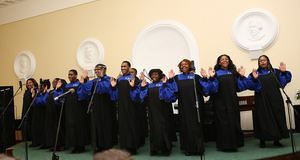Demagoguery and the Westboro Baptist Church: Deconstructing the Tactics of HateDemonizing the OutgroupAs mentioned before, Westboro refers to any members of their rhetorical outgroup (gays, Jews, celebrities, politicians, etc.) as "fags." The church blames tragedy and death in America on the sins of the outgroup, as seen from the targets of their protests. By blaming the outgroup for these tragedies, Westboro does what Roberts-Miller refers to as "demonizing or dehumanizing the outgroup." This tactic helps polarize the situation further, in an attempt to persuade the audience that the outgroup is not only evil or Satanic, but also the cause of our suffering (Roberts-Miller, 2008). This demonization takes form within the use of the term "fags" to identify the outgroup. The term, as it has been used through recent history, is unquestionably still capable of evoking passionate emotions. A painful history of violence and discrimination toward homosexuals still maintains a strong connection to it, and such brazen and repeated use of the term is a calculated choice. It is meant to belittle and hurt those it is aimed at, as well add a shock factor that draws further attention to their message. Within their rhetorical choices, the term serves to dehumanize the outgroup, as they are no longer people with names, but simply "fags." A recent example of this demonization was seen when the Westboro Church began its "Perpetual Gospel Memorial to Matthew Shepard." According to James Brooke (1998), Matthew Shepard was a "gay college student who was kidnapped, robbed and pistol-whipped. [He] died on Oct. 12, 1998, five days after he was rescued from a Wyoming ranch where he had been left tied to a fence for 18 hours in near-freezing temperatures" (p.199). The web page "memorial" begins with another Bible quote, "'And in hell he lift his eyes, being in torments...and he cried and said...have mercy on me...dip the tip of his finger in water, and cool my tongue; for I am tormented in this flame. The smoke of their torment ascendeth forever and ever; and they have no rest day or night.' Luke 16:23,24; Revelation 14:11" (Westboro, 2013). Claiming that "Matthew Shepard died because he was trolling for strange flesh and meth," the church attempts to demonize Shepard, in an attempt to prove that he deserved to die ("Matthew Shepard Memorial," 2013).Anti-IntellectualismOffensive, shocking, and certainly memorable, The Westboro Church's obscene "memorial" to Matthew Shepard is one of many very blunt, direct messages that the church delivers to its audience in an effort to stand out and gain attention. The church is well known for their in-your-face attitude and abrasive demeanor. Members are often seen shouting Bible verses or singing offensive songs at their protests over the shouts of angry passersby. Roberts-Miller (2008) would describe this tactic as "anti-intellectualism" or anti-discourse. "The last thing a demagogue wants is fair and open discussion of issues—the main goal of demagoguery is to keep opposition points of view from getting a fair hearing" (p.8). The Westboro Church successfully shuts down and prevents discourse by simply shouting over it. Albeit some could argue this to be a childish approach, it works on a level of cancelling the conversation. They create a breakdown in communication by turning the discussion into a screaming match. An excellent example of this can be seen in the video "Westboro Church Humiliated," when the interviewer's questions are frequently answered by shouting or singing, seen here:
Westboro's reliance on Bible verse is yet another form of this aversion to discourse. Their own interpretation of the Bible is the cause and basis for all of their arguments. The church's own website (2013) will quote the Bible in supporting their cause: "The certainty that all impenitent sodomites (under the elegant metaphor of "FAGS" as the contraction of faggots, fueling the fires of God's wrath) will inevitably go to Hell (e.g., Romans 1:18-32, 1 Corinthians 6:9-11, 1 Timothy 1:8-11, Jude 7, etc.)" (Westboro) But when faced with questioning about the church's logic, members will do anything to avoid answering, from shouting, to chanting, to even just walking away. Fred Phelps himself can even be seen walking away from Michael Moore in this clip from a documentary on the WBC:
Martyrdom of the RhetorAll of this media attention on the Westboro Church has led to an interesting phenomenon, and certainly one of the most unique characteristics of the demagogue. Roberts-Miller describes a characteristic of demagoguery called "martyrdom of the rhetor," in which she says that demagogues "love to claim to be martyred for their beliefs, and any criticism is martyrdom" (Roberts-Miller). This can be seen all throughout the church's rhetoric, be it on their website or in interviews. This quotation from the front page of their website (2013) shows exactly how Westboro uses this technique: "Since 1955, WBC has taken forth the precious from the vile, and so is as the mouth of God (Jer. 15:19). In 1991, WBC began conducting peaceful demonstrations opposing the fag lifestyle of soul-damning, nation-destroying filth. In response, america bombed WBC, sued WBC, prosecuted WBC, burned WBC. God is now america's enemy: 6693 dead soldiers; 218,400,000+ gals. of oil in the Gulf; $16.77 trillion+ national debt. 'Arise, O LORD, in thine anger...because of the rage of mine enemies...' (Ps 7:6)" (Westboro) For the past few years, the church has been receiving open threats from the increasingly infamous Internet hacker group Anonymous. Known for their extreme knowledge of the web and computers, Anonymous has developed attention from mainstream news stories such as involvement in the Wikileaks scandal and the attacks on Internet security specialist Aaron Barr. Anonymous has threatened Westboro publicly, best seen in this interview in which the hacker takes down Westboro's website live on air:
As unique and admittedly interesting as this feud between a hate group and Internet hackers has been, it has given the church the opportunity to continue to use one of its most powerful tools. In the previous interview, Shirley Phelps accuses Anonymous of being "thugs" and "criminals," therefore placing herself and her family as the victim of their crimes. Not only does this characteristic represent their claims of martyrdom, but leads to a much larger point about the church's rhetorical success.Continued on Next Page » Suggested Reading from Inquiries Journal
Inquiries Journal provides undergraduate and graduate students around the world a platform for the wide dissemination of academic work over a range of core disciplines. Representing the work of students from hundreds of institutions around the globe, Inquiries Journal's large database of academic articles is completely free. Learn more | Blog | Submit Latest in Business & Communications |
















